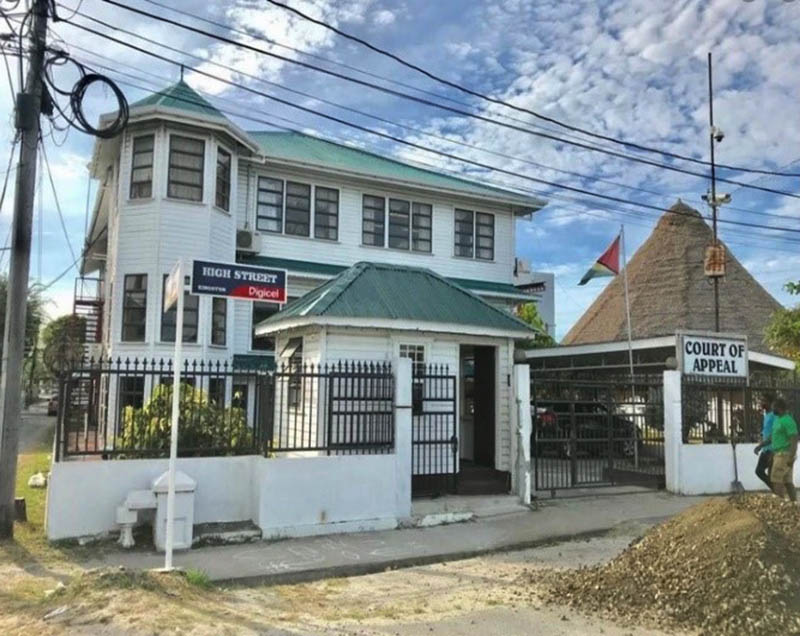The long-awaited written ruling of acting Chief Justice Roxane George SC throwing out the second petition challenging the results of the March 2nd 2020 general elections, has finally been made available, which will now allow for the record of appeal challenging that ruling to be prepared.
When the matter was called before the Court of Appeal yesterday morning for a status update, acting Chancellor Yonette Cummings-Edwards informed that the Court was in receipt of the Chief Justice’s ruling.
Attorneys in the matter also confirmed that they too had received the ruling.
That outstanding judgment hindered the earlier preparation of the full record of appeal.
With the written judgment having now been made available, the Court was able to direct counsel for the petitioners to prepare their record of appeal to be filed and served no later than November 22nd.
The matter was then adjourned to Wednesday, December 7th for a case management conference (CMC), at which dates will be set for the hearing of the substantive appeal.
The matter is being heard by Chancellor Cummings-Edwards, along with Justices of Appeal Dawn Gregory and Rishi Persaud.
Presenting his motion to the appellate court just under a month ago for an urgent hearing, after what he described was a 17-month delay in addressing the appeal, attorney for the appellants/petitioners, Roysdale Forde SC, laid the blame squarely at the feet of the judiciary, which he said was responsible for that “institutional/systemic failure.”
Forde argued that his clients—Claudette Thorne and Heston Bostwick—in whose name that petition was filed, have already “suffered a substantial prejudice,” owing to the “substantial delay.”
He noted that more than a year after the conclusion of the matter before the High Court, Chief Justice George was still to render her written judgment, which is needed to form part of the record of appeal.
He had said that despite strenuous efforts some 18 months after the April 2021 ruling, he had still not succeeded in getting a copy of the written ruling and sought the assistance of the appellate court in this regard; even as he emphasized that Justice George was way outside the 90-day timeline by which written judgments are to be rendered.
Chancellor Cummings-Edwards had said that such matters “should indeed be heard in a timely manner,” while adding that whether the delay lay at the feet of counsel or the judicial system, is an issue that would have to be investigated.
Background
Thorne and Bostwick are adamant that the Elections of March 2nd, 2020, were unlawfully held.
Their petition which was dismissed, sought to invalidate the national recount of ballots cast following the contentious announcement of those polls. Among other things, Chief Justice George ruled that Section 22 of the Elections Law (Amendment) Act 2000 and Order 60 made thereunder by which the recount was facilitated, were not in violation of the Constitution.
It was their contention that Order 60 was “bad” in law because it was brought into force by an unlawful piece of legislation—Section 22 of the ELAA.
They wanted the Court to determine among other things, questions regarding whether the elections had been lawfully conducted or whether the results had been, or may have been affected by any unlawful act or omission and in consequence thereof, whether the seats in the National Assembly had been lawfully allocated.
Dissatisfied with the ruling, they lodged an appeal before the Court of Appeal.
The Opposition had filed two petitions challenging the results. In January of last year, Justice George dismissed the first of those petitions after finding that the Party’s presidential candidate David Granger was not served on time.
Petitioners Monica Thomas and Brennan Nurse subsequently appealed to the Guyana Court of Appeal which ruled that it had jurisdiction to hear the challenge.
Vice President Jagdeo and the Attorney General, however, challenged that decision which was overturned by the Caribbean Court of Justice (CCJ) just two weeks ago.
The Trinidad-based court of last resort for Guyana ruled that the local appellate court has no jurisdiction to hear the matter, since it had not been finally determined on its merits by Chief Justice George and therefore cannot be appealed.





